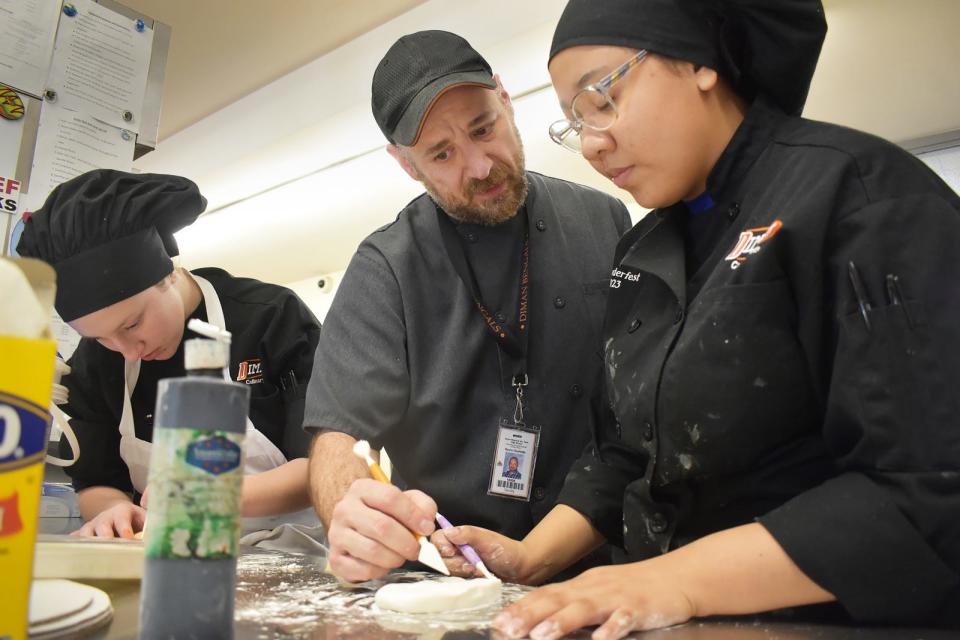Last year, the comedian Marc Maron brought the author Chuck Klosterman on as a guest on his WTF podcast. The two discussed many things (including Klosterman’s then-new book, But What If We’re Wrong?, which he was there to promote), but one of them was sports—and the particular thrill that they offer to audiences. Sporting events, Klosterman argued, promise that most dramatic of things: an unknown outcome. Unlike other widely watched events—the Super Bowl halftime show, the Grammys, the Oscars—the primary selling point of sporting events is that their endings are, by definition, unpredictable. Within them, anything can happen.
Well. While you can say a lot about the Oscars on Sunday, you can’t say that the glitzy awards show was boringly predictable. The 89th Annual Academy Awards ceremony, right at its conclusion, brought a mixture of confusion and shock and full, deep delight to its viewers as Warren Beatty and Faye Dunaway teamed up to announce the Best Picture winner and proceeded to, because of a backstage flub, announce the wrong movie. Chaos—and really, really good TV—ensued. Tired East Coasters were summoned back to their living rooms from their bedrooms, on the grounds that “ohmyGodyou’veGOTtoseethis.” Twitter erupted with jokes—about Bonnie and Clyde being at it again, about Schrödinger’s envelope, about “Dewey Defeats Truman” getting an Oscars-friendly update. It was late on a Sunday evening, and the unexpected had happened in the most unexpected of ways, and the whole thing was, as my colleague Adam Serwer perfectly summed it up, Moon-lit.
The whole thing was also, however, a reminder of how rare it has become for audiences to witness, collectively, something that is truly Unexpected. This was live TV, with all the potential human error that live TV can bring—chaos, correction, drama, grace—at its depths but also its heights. What happened on Sunday hewed to roughly the same mechanics that gave the world all those Left Shark memes, and those “Nevertheless, She Persisted” tattoos, and the term “wardrobe malfunction”: The Oscars evoked caring by way of surprise. The Best Picture flub has become infamous overnight for roughly the same reason its predecessors did: It is exceedingly rare, in the highly produced world of mass media, for expectations to be thwarted.
We know so much, nowadays. We are, in fact, sure of so much—about politics and human psychology and Hollywood awards shows and the correct ingredients of guacamole. During a time when Google has made so much information instantly attainable, knowingness has become a default presence in American cultural life. Oooh, that show is supposed to be excellent. That movie is supposed to be terrible. Poke bowls are the thing now. Big cultural events, the stuff of the Grammys and the Emmys and the Oscars, are in many ways the culmination of that posture: We know precisely what to expect of them. We can report, as they play out, that everything went according to plan, because we knew from the beginning what they were supposed to be; we can do that reporting, as well, with a note of disappointment. There are few things duller, after all, than met expectations.
In that context, the Beatty-Dunaway-Oscars flub was a gift to audiences (and perhaps to ABC’s future live-audience ratings). It was also Chuck Klosterman’s point to Maron, at once proven and proven wrong. Here was the anything-can-happen logic of the live sporting event, applied to Hollywood’s highest, most ceremonialized, and most expectation-driven, of rituals. That was a powerful thing: During a moment in the United States that so often takes for granted that “reality” is something that can be produced as well as experienced, the Best Picture Oscars flub was a powerful reminder that reality, still, has its own production values.
Yes, the flub was many other things, too: a shame for Moonlight, which so richly deserved to win Best Picture and whose victory threatens to be overshadowed by the mistake and its ensuing dramas. A shame for La La Land, whose producers delivered their full acceptance speeches before learning that their “win” had been announced in error. A field day for photographers both professional and non-, who snapped reaction shots onstage and backstage and among the celebrity audience. A moment of grace, as La La Land’s producer, Jordan Horowitz, met Jimmy Kimmel’s cheeky suggestion that everyone should get an Oscar with a politely defiant “I’m going to be really thrilled to hand this to my friends from Moonlight.” And also, sure: a metaphor for the slings and arrows of the 2016 election. A ratification of pop culture’s current obsession with alternate realities. A vehicle for many, many jokes at the expense of Steve Harvey.
Mostly, though, it was a twist ending that arrived, by the looks of things, in the twistiest of ways: a shock that came not at the hands of a savvy producer, but at the hands of quirky reality. Twist endings may have been a defining feature of the events of 2016 and early 2017—the reality show that was the 2016 presidential campaign found its pundit-ratified frontrunner vanquished in the final episode; the 2016 World Series featured another victorious underdog; Super Bowl LI found the expected winners winning, but only after its game went into nail-biting overtime. Their twists, however, took place within events whose endings were, by definition, unknown. The Oscars was a ceremony, shockingly interrupted. It was expectation, compellingly thwarted.
And so: It was powerful in a way that few things can be, anymore, in a world that knows so much and expects, in the end, so little. In an essay for Screen Crush last year, Erin Whitney argued that “ours is a culture built on anticipation, where movies end with scenes teasing the next installment in the franchise, never allowing a moment’s rest to absorb what we just saw. We talk about movies years before they debut, we analyze TV plot twists, and anticipate albums for years before hearing a single song.” This whole process has led, Whitney argued, to “the slow death of surprise.”
The best evidence for that may be the fact that marketers have recently been focused on surprising consumers—capitalism doing its best to keep that particular kind of magic alive. The dropped album. The surprise TV show. The secretly produced trailer. The live-aired, anything-could-happen TV musical. They are trying to capture what Klosterman was conveying to Maron in that WTF interview: “Sports is a connection to authentic aliveness,” the author put it to the comedian. “This is not something that anybody can control or script. It’s this unknown thing.” He added: “There’s something real interesting about ‘nobody knows,’ because you just don’t experience that anymore.”
You don’t, until you do—until that mistake makes its way onto the glitziest and scriptiest of all of Hollywood’s stages. Sunday’s Best Picture flub is not only already iconic; it is also already the subject of conspiracy theories from a wide range of Oscar truthers who suggest that, among other things, the mistake was the result of President Trump exacting revenge on Jimmy Kimmel; or a prank pulled by Kimmel himself; or the dark dealings of Leonardo DiCaprio. They may have a point; it is unclear, for now, how the wrong card got into Warren Beatty’s hands. What they forget, though, is what Klosterman knows, and what all those delighted audiences, on Sunday, knew along with him: that the best conspirator is often people’s great capacity to make big, and dramatic, mistakes.
Signup bonus from





